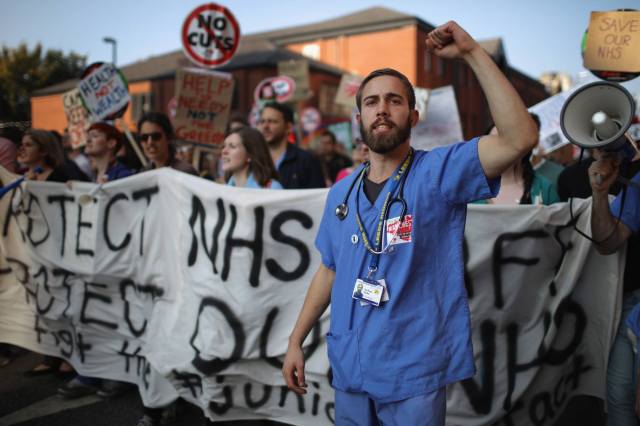Credit: Getty

The thing that makes Brits most proud to be British is the National Health Service. Their affection for it borders on a cult-like devotion.
This explains why billions of people around the world were treated to the weird Olympic opening ceremony spectacle of a song and dance routine that celebrated doctors, and nurses, and hospital beds. As if no one else had universal healthcare.
At the heart of the love affair is an obsession with keeping the private sector out. It has blinkered people to the NHS’s failings, preventing much needed reform to raise standards. So the time has come to slay this obsession with public-sector delivered healthcare.
The introduction of free healthcare by post-war British prime minister Clement Atlee was good news for a war-weary nation. Seventy years later, that 1940s sentiment lingers on. It’s supported by a powerful subjective experience. Of course people are grateful when they are sick and in the hands of doctors and nurses. It would seem churlish to think critically about such a service.
Added to this is the long-standing tradition of scare-mongering from the Left, with encouragement from NHS trade unions who have a big vested interest in the status quo – with its 1.7 million employees, it’s the world’s fifth largest employer.
The message is: embrace the NHS, or be cast into outer darkness. Outer darkness, of course, is the United States. Just before the 2017 general election, for example, one GP writing in the Independent newspaper characterised it as a choice “between US-style private health insurance under a Theresa May dystopia, and a public NHS under Jeremy Corbyn’s progressive vision”.
But the contrast with the United States is misleading. Most Americans don’t think they’re in ‘outer darkness’ at all. They have medical insurance. Or special coverage as current and former members of the military. Or they benefit from free provision for the very poor, and subsidised coverage for seniors. Most Americans have access to terrific healthcare.
Healthcare scare stories from the US have absolutely nothing to do with the fact that most of this care is provided by private companies. The issue is the lack of universal care. [1. The U.S. set-up is actually rather complicated – more so than its critics or supporters often allow. Both the military medical system and the Veterans’ Administration (for former military) are government-run systems rather like the NHS. Medicaid (free healthcare for the poor) and Medicare (for the retired, who make relatively small payments) work more like the European systems – the government picks up the tab but the private sector delivers the care. “Obamacare”, the expansion of healthcare help for the poor under President Obama, is also built on private sector delivery.]
A more honest comparison would be with the healthcare systems of continental Europe. But loud-mouthed defenders of the NHS status quo never dare to make European comparisons, because they know they would lose the argument.
Because right across Europe there is healthcare for rich and poor alike, even for the homeless. It’s just not healthcare delivered by governments. Like the US, western European countries have healthcare delivered by private companies.
But unlike the US, they cover everyone. The trouble is, the national love affair with the NHS doesn’t allow for learning. If it did, Brits might be a little less enamoured with the status quo.
Having analysed the evidence, the London-based think tank the IEA found that:
“In terms of outcomes, quality and efficiency, [continental] social health insurance systems are consistently ahead of the NHS on almost every available measure.”
Back in 2015, the right-leaning Telegraph reported that “Britain has the worst cancer survival rates in western Europe, according to the largest ever study of the disease…Countries such as France, Italy, and Germany all did far better than the UK, which was on a par with the Czech Republic.”
In 2017 the left-leaning Guardian reported another study which found that “the UK’s improvements [in cancer survival rates] often lag behind those of other European countries”.
Should the UK follow these European countries into a system where the state ensures access while leaving companies to supply healthcare? Perhaps. But that conversation is politically impossible – reform of the NHS is the third rail of British politics.
Even minor, common-sense innovations are resisted. What about a small charge to see a doctor? There’s widespread agreement many visits are a waste of time. Or could there be a fee for a missed appointment?
The NHS has all but replaced the Church of England as Britain’s national religion. But this love affair is doing the British public a disservice.
What are we waiting for? It’s time to slay the NHS dragon.










Join the discussion
Join like minded readers that support our journalism by becoming a paid subscriber
To join the discussion in the comments, become a paid subscriber.
Join like minded readers that support our journalism, read unlimited articles and enjoy other subscriber-only benefits.
Subscribe